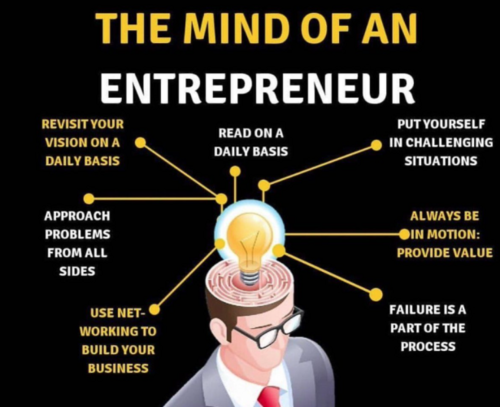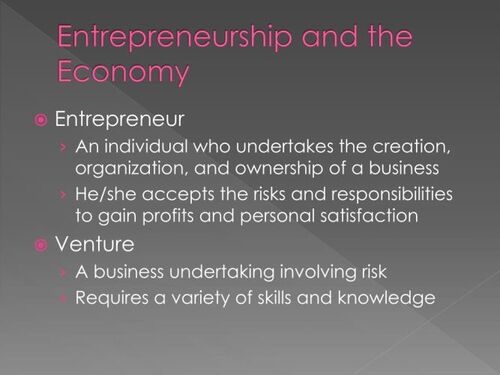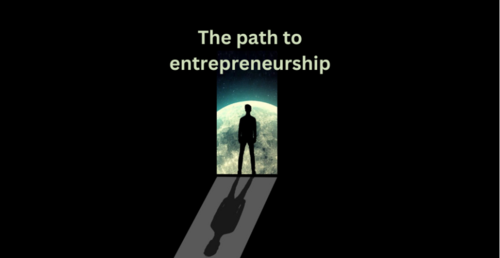
What Does it Mean to be an Entrepreneur and How to Get Started?

One of the biggest mistakes people make is trying to force an interest on themselves. You don't choose your passions; your passions choose you.
Opinions expressed by Entrepreneur contributors are their own.
An entrepreneur is someone who creates or otherwise manages an original business Becoming an entrepreneur may not have a degree requirement nor specific professional requirements but it takes lots of knowledge, passion and a drive to achieve. If you want to become an entrepreneur, understanding the steps to take on this career path can help you start your own business venture effectively.
In this article, we share what an entrepreneur is, including what to consider when becoming an entrepreneur and address some common questions about the career opportunity.
Related: What does it mean to have an Entrepreneurial Mindset?

An entrepreneur is an individual who creates and manages a business. They often take on greater risks than the average business person, possibly reaping greater rewards. Economists recognize entrepreneurship as an essential resource in production. Entrepreneurs use land, labor and capital to give back to the economy by providing goods and services.
For most new projects, an entrepreneur creates a business plan that lays out the resources required for hiring, financing and the leadership of a new business. Capital funding can be hard to come by for new entrepreneurs and their projects, so they often start small and invest their own resources into the project. Some entrepreneurs start projects alone, taking on the risk-reward ratio with little help. Others seek partnerships. With the benefit of additional credit and resources, businesses tend to grow faster, seeing greater success.
Related: The Values and Skills You Need to Become a Successful Entrepreneur

To succeed, entrepreneurs coordinate with capitalist economies. They're identified as a resource that can build profit and provide new opportunities. Entrepreneurs make difficult decisions, often taking risks to achieve their goals. It's because they're willing to take these risks that entrepreneurs make a significant impact on their local economies.
Related: Tips For Building A Profitable Network As An Entrepreneur

What words pop into your head when you look at those names above? If you're like most people, the terms "billionaire," "genius," or "workaholic" might come up. And while such descriptors may be accurate, they aren't necessarily what made these people successful entrepreneurs.
You see, first and foremost, successful entrepreneurs are problem solvers. Their business ideas tend to focus on bettering society, solving a problem or being the first to capitalize on a new trend.
Zuckerberg created Facebook so students at his college could connect, interact and engage with one another. Musk saw the potential for Tesla's electric cars and decided to become its CEO. Sarah Blakley knew women wanted comfortable, shaping undergarments and she started Spanx to capitalize on that need.
These men and women found success because they saw problems and did something to solve them. This doesn't make them more intelligent than their competition — it makes them more observant. They saw something that society needed and decided to make it a reality.
That's what lies at the heart of entrepreneurship. You must be willing and able to uncover society's needs and wants. After that, it's simply a matter of maintaining the momentum of an idea until it becomes a reality.
That's what Leah Busque did when she started TaskRabbit. She took jobs that used to be posted on community message boards — raking leaves, walking dogs — and created an app to connect workers with customers.
In many cases, entrepreneurs are enthusiastic about one specific thing and invent something to improve it. Take Nick Woodman, who founded GoPro. He was a surfer looking to make cool videos of himself riding waves and decided a small, portable high-resolution camera would be helpful.
Ultimately, it doesn't matter what you create. All that matters is that you recognize a problem and envision a solution. Being a successful entrepreneur means being in the business of ideas — a currency we all have in abundance.
Related: What are the absolutely Essential Ingredients for being a Successful Entrepreneur?

If you want to become an entrepreneur, you first must realize that — in a way — you already are. The first step to becoming an entrepreneur is to decide that doing so is an attainable goal. This kickstarts the momentum and innovation you can harness to make your ideas a reality and a success.
The next step? Find a problem. Remember that this doesn't need to be some huge, global issue. All you're looking for is a way to improve the lives of others, even if it's just a little bit.
Ben Cohen and Jerry Greenfield started Ben & Jerry's because Cohen preferred chunkier, tastier ice cream. They weren't trying to save the world. They weren't creating a brand-new small business or innovation. However, they are no less successful because of that.
Another thing you'll need as a successful entrepreneur is versatility. Specifically, you'll need to be versatile in your knowledge. Learn how to research so you can support your ideas or how to approach problem-solving properly so that you don't waste time.
Elon Musk's background is in economics and physics, but he works almost exclusively in tech. Fortunately, he was willing to expand his versatility through tech internships and private research.
The next step towards becoming a successful entrepreneur is networking. After all, bringing ideas to life and innovation costs money and can require a lot of help. At the same time, some people do it all on their own; most leverage friends, colleagues and even mere acquaintances throughout their journey.
Apple struggled to get off the ground until Steve Jobs and Steve Wozniak connected with multimillionaire Mike Markkula. He was the one that provided the seed money and new business advice to help the company grow. You never know when someone in your network will help you, so grow that network as much as possible.
At this point in your entrepreneurship journey, you may encounter challenges, sometimes the sort that makes you want to give up. But remember that only entrepreneurs who stick to their idea, nurture them and work to overcome their problems succeed.
Sir James Dyson spent years trying to build and promote his bagless vacuum cleaners. Unfortunately, significant manufacturers repeatedly refused to distribute them. Finally, he opened up his manufacturing facility and found success as his products became the fastest-selling vacuum cleaners in UK history.
Lastly, a good entrepreneur needs to know when to ask for help. Being versatile is helpful, but it's no substitute for expertise. Instead of trying to do everything yourself, learn when to bring in a professional.
When Sarah Blakely's Spanx idea took off, she had zero business experience. So, she decided to bring on businesswoman Laurie Ann Goldman to be her CEO. This eventually ushered in the company's most profitable period and helped make Blakely a billionaire.
Related: The Importance of Self-confidence for Entrepreneurs and How to Increase Yours

Now that you have a better understanding of what it takes to become an entrepreneur, finding a problem that needs solving is the only thing left. Remember, your solution doesn't need to change the world — it just needs to improve it a little bit. The rest comes down to hard work, confidence and commitment.
Markethive - a Powerful Ecosystem for Entrepreneurs
.png)
MarketHive is an entrepreneurial social marketing platform with the combined strength of LinkedIn, Amazon, Facebook and Marketo.
Markethive is at the forefront of marketing in today's online environment.
It's the perfect marketing platform for online marketers, businesses, affiliate marketers, brands, cryptocurrency enthusiasts, investors and anyone else that requires an online presence.
More info HERE <<<<
About: Andries vanTonder
Over 40 years selfemployed
He is a Serial Entrepreneur, an Enthusiastic supporter of Blockchain Technology and a Cryptocurrency Investor
Find me : Markethive Profile Page | My Twitter Account | My Instagram Acount | and my Facebook Profile.
